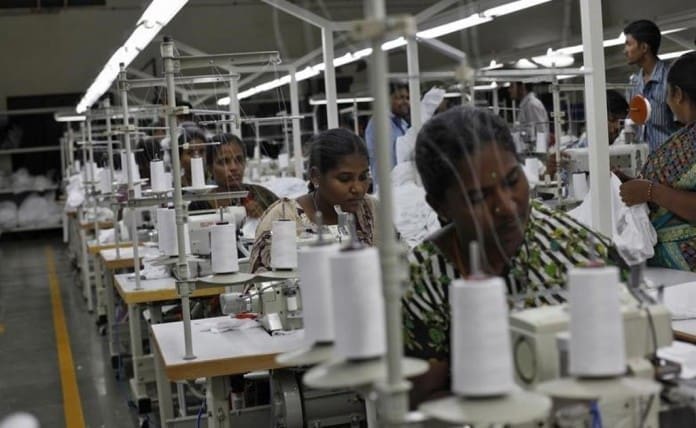By Anuradha Nagaraj
Chennai: A proposed new township for garment industry workers in textile hub of Tirupur in Tamil Nadu will tackle the problem of exploitation of workers housed in hostels on factory sites, campaigners said on Monday.
In a first, the Tirupur Exporters’ Association, a trade body, has asked the Indian government to give the go-ahead for the construction of 100,000 houses and 200,000 dormitories in and around Tirupur to accommodate workers.
In a proposal presented to Finance Minister Arun Jaitley on November 26, the association suggested a public-private partnership to build a satellite township near Tirupur with schools, hospitals, shops and other amenities.
It has also recommended the construction of hostels for single working men and women in Tamil Nadu, where the country’s textile industry is concentrated.
“We are not able to attract or retain labour because living conditions available to them at present are not sufficient or ideal. Housing is a big problem,” the association secretary S Shakthivel told the Thomson Reuters Foundation.
The $40 billion Indian textile and garment industry, much of which operates in the informal sector and is poorly regulated, employs an estimated 45 million workers.
According to the association, the industry in Tirupur employs an estimated 800,000 workers, most of them migrant workers accommodated in cramped hostels run by the factories.
Living in the workplace leads to exploitation, with workers being forced to toil for up to 12 hours a day, campaigners say.
“Nobody has access inside these spaces and there are restrictions on the freedom of movement of workers,” said Karuppu Samy, director of non-profit group the Rights Education and Development Centre that campaigns for labour rights.
“They are not allowed to leave the premises unescorted, visits from family are not encouraged and there have been numerous complaints of sexual harassment in the confines of these rooms.”
Following the rape of two women workers in their hostel rooms in Pollachi in 2013, the Tamil Nadu state government implemented a new law regulating hostels.
“The most exploitative hostels are those run by the textile and garment industry,” Samy said. “In Erode district there are 170 hostels run by mills inside their compounds. Regulating them has been a great challenge.”
In June, the Indian government announced a package to generate 10 million jobs and boost exports by $30 billion over the next three years, but the measures, including cutting overtime hours, have raised concerns about workers’ rights.
Affordable Housing Will Help ‘Exploited’ Workers In Tirupur: Activists

